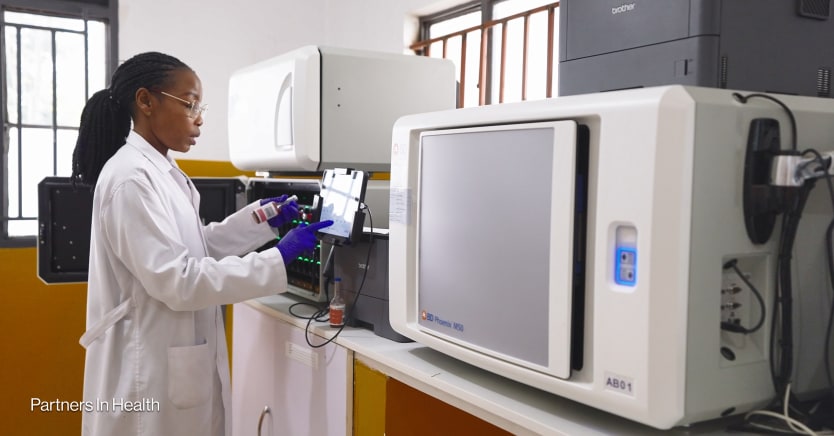Collaborating for greater impact — Rwanda’s fight against AMR

Antimicrobial resistance, or AMR — the process of bacteria evolving to resist the drugs designed to kill them — is one of the top 10 global health threats today, according to the World Health Organization. Infections related to AMR already claim more than 1 million lives annually, a number projected to nearly double by 2050 if urgent action is not taken.
The global rise in AMR complicates infection management by reducing the effectiveness of standard therapies, leading to prolonged hospital stays, increased health care costs, and higher mortality rates.
AMR disproportionately affects the most vulnerable patients. Infections are a leading cause of morbidity and death among cancer patients, many of whom are immunocompromised due to chemotherapy and other medical interventions. It is estimated that 1 in 5 cancer patients undergoing treatment are hospitalized due to infection, with antibiotics serving as the main line of defense. A recent study showed that cancer patients receiving inpatient care have a 1.5 to two times higher risk of encountering an AMR pathogen than noncancer patients.
Understanding the scope of this issue remains a challenge. Laboratory data informs antibiotic stewardship and infection prevention programs. However, many countries have limited infrastructure to conduct microbiology testing needed for patient care and AMR surveillance.
Nov. 18-24 is World AMR Awareness Week, a global recognition of the risks of AMR and the actions needed to slow the spread of drug-resistant infections. The theme, “Act Now: Protect Our Present, Secure Our Future,” calls for action today. It also aptly describes the collaboration between teams from Partners In Health, or PIH; the Rwandan Ministry of Health; the University of Global Health Equity, or UGHE; Pfizer’s Accord for a Healthier World; and BD (Becton, Dickinson and Co.).
Experts ready to roll up their sleeves
In Rwanda, the AMR challenge is especially acute: In 2021, Rwanda had the 41st highest age-standardized mortality rate associated with AMR. As Rwanda elevates AMR as a priority, strengthening its health system — particularly through improved diagnostics, infection prevention and control, and antimicrobial stewardship — is essential for implementing effective interventions and saving lives.
Two years ago, teams came together in Kigali, Rwanda, to identify opportunities to help the country in its fight against AMR. Each brought different areas of expertise and knowledge, united by a single focus: improving care for patients in Rwanda.
• PIH is a social justice organization that responds to the moral imperative to provide high-quality health care globally to those who need it most. It launched the University of Global Health Equity to train a new generation of health leaders equipped to build and sustain equitable health systems in underserved regions.
• Pfizer’s Accord for a Healthier World aims to help close the health equity gap in lower-income counties to expand access to medicines, help strengthen health systems, and improve the quality of care for all.
• BD is a global medical technology company dedicated to improving medical discovery, diagnostics, and delivery of care, with a division focused on infectious disease diagnostics.
Together, they identified three workstreams to align their strengths and capabilities with the specific needs of the hospital system: diagnostic stewardship, infection prevention & control, and antimicrobial stewardship.
A multipronged approach
These three workstreams were deployed at Butaro Level II Teaching Hospital, or BL2TH, in Rwanda, with additional efforts planned across the country in the future. With nearly 300 inpatient beds and an emergency department, the hospital serves patients from across the region, including a significant number of oncology patients.
In July 2012, it opened the Butaro Cancer Center of Excellence, developed by PIH, with support from the Dana-Farber Cancer Institute and the Rwandan government, offering the first national cancer referral facility in rural East Africa.
Each of the workstreams deployed through the collaboration is contributing to better data and improved antibiotic use.
• Diagnostic stewardship – the Superlabs Against Superbugs program strengthens lab capabilities to optimize the use of diagnostics in support of patient care.
• Infection prevention and control – the hospital’s first point prevalence survey, or PPS, marks a key step in combatting AMR and promoting rational, evidence-based antibiotic use.
• Antimicrobial stewardship – training on appropriate antibiotic use and collaboration with the pharmacy enable greater access and understanding of the latest data for improved antibiotic utilization.
These efforts are driving greater understanding of BL2TH’s needs and defining actionable steps. With over 40 updated workflows, processes, and standard operating procedures, the microbiology laboratory and clinicians are better equipped to work together to understand how AMR is impacting their patients.
“Having access to microbiology testing has completely changed the way we manage infections. We can now prescribe antibiotics with greater confidence and precision, reducing the risk of resistance and unnecessary medication.”
— Dr. Pascal Bihizimana, an internal medicine specialist at Butaro Level II Teaching Hospital in RwandaMaking an impact
Under the support of this collaboration, the lab is now collecting valuable data on local resistance patterns to inform treatment guidelines and public health responses in the region.
With a stronger laboratory and clinical interface, clinicians at BL2TH are now equipped with reliable culture and sensitivity testing, allowing them to identify specific pathogens and determine the most effective treatments. This shift from empirical to evidence-based treatment has improved patient outcomes, especially in cases of complicated infections, surgical site infections, and antibiotic-resistant bacteria.
The antimicrobial stewardship workstream is providing capacity building for the hospital’s health care professionals. Over 60 staff members have received education on how to appropriately use antibiotics as per AWaRe classification of antibiotics for evaluation and monitoring of use 2023, and advance their knowledge on rational use of antibiotics. At the Butaro Cancer Center of Excellence, cancer patients now have access to both lifesaving treatments and a hospital equipped with microbiology data to support their overall well-being throughout their care.
Moving forward … together
Every time a patient accesses better care, it demonstrates how programs built on collaboration make a difference. Rwanda’s fight against AMR shows what’s possible when we align the expertise of local, regional, and global experts to national health priorities. At all levels, hard work and a shared focus can make a difference — and slow the impact of AMR.
Search for articles
Most Read
- 1
- 2
- 3
- 4
- 5










